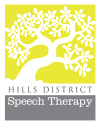At Hills District Speech Therapy, we continue to support clients and their families as they transition from adolescence to adulthood. We provide services to clients aged 18 years and over with persistent language impairments and lifelong disabilities including:
- Autism Spectrum Disorder
- Down Syndrome
- Intellectual Disabilities
- Cerebral Palsy
- Learning Disabilities (including Dyslexia and Developmental Language Disorder)
- Mental Illnesses
- Genetic Disorders (including Fragile X Syndrome, Prader Willi Syndrome and Angelman Syndrome)
- Vision and hearing impairments
- Traumatic Brain Injury (TBI)
The Speak Up podcast by Speech Pathology Australia highlights conversations with esteemed contributors in the speech pathology space. In this episode, Dr Andy Smidt talks about the role of Speech Pathologists in working with people with intellectual disabilities.
About our Services
Prior to commencing therapy at HDST, our therapists will comprehensively assess your/the client’s communication skills, including their understanding and use of language, social skills, literacy, speech sound production, and competence in using augmentative and alternative communication tools. We also work collaboratively with the client, their family and wider support network to determine their functional communication needs.
Depending on their individual goals and preferences, our therapists may target the client’s functional communication skills in one or more of the following areas:

Social Skills & Relationships

Self Care & Hygiene

Catching Public Transport

Preparing & Cooking Meals

Reading Comprehension & Written Expression

Voting

Organisation, Planning & Problem Solving

Managing Money

Messaging & Communicating Online

